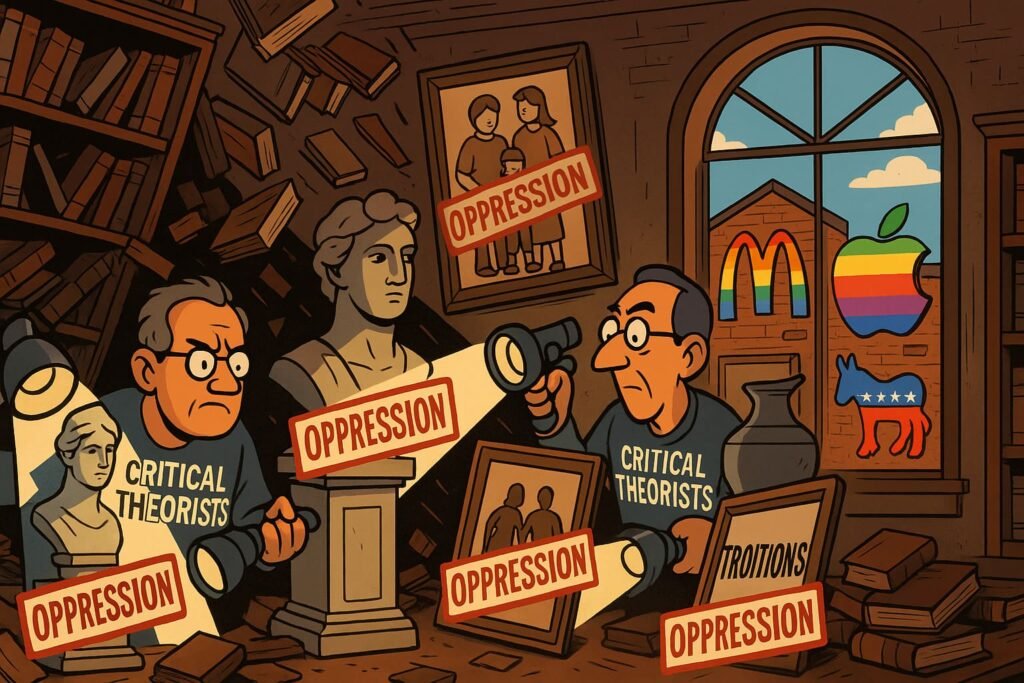Critical Theory – The Blueprint for Woke Politics
If postmodernism made truth optional, Critical Theory made criticism mandatory. Born in the Frankfurt School in the 1930s, it started as an academic project to question capitalism, authority, and culture. On paper, it was about challenging power. In practice, it became the intellectual toolbox that modern woke politics still draws from.
Critical Theory sounds sophisticated. But strip away the jargon, and the method is simple: criticise everything — culture, family, religion, traditions, even language — until all that remains is politics.
Table of contents
What Is Critical Theory?
Critical Theory isn’t a single idea, it’s an approach. Instead of studying society to understand it, critical theorists study society to expose its flaws and push for change.
That means every institution — schools, media, churches, governments, even families — is framed as a system of oppression. The goal isn’t reform but radical transformation.
The Frankfurt School and Its Legacy
The thinkers behind Critical Theory — Horkheimer, Adorno, Marcuse, and later Habermas — fled Nazi Germany and reshaped social thought in the West. They argued that culture itself kept people obedient. Entertainment, religion, and tradition weren’t neutral — they were tools of control.
This suspicion of culture didn’t stay in the seminar room. It trickled into universities, schools, media, and activism. Decades later, the spirit of “critique everything” became the backbone of woke politics.
From Critique to Activism
The danger of Critical Theory is its one-way lens. Everything becomes suspect. Authority? Oppression. Family roles? Oppression. Shared traditions? Oppression.
Once you label everything oppressive, the only way forward is perpetual activism — never-ending struggle to dismantle old systems. That’s why today’s politics feels like a rolling critique: statues, language, history, institutions — nothing is safe.
Why Critical Theory Matters Today
Critical Theory is the intellectual root of the culture wars. It gave us the habit of seeing hidden oppression everywhere, and the language to demand constant change.
Corporations and politicians co-opted it too, because critique is easy to brand. A rainbow logo or “equity” pledge costs less than fixing wages or taxes. It made activism the new marketing strategy.
Buzzwords
Critical Theory gave us a new political vocabulary — words that sound neutral, but carry a built-in suspicion of society:
- “Oppression” – the catch-all for every institution and tradition.
- “Hegemony” – the idea that culture keeps people obedient without force.
- “Power structures” – hidden systems controlling everyday life.
- “Systemic” – problems explained as baked into the entire system, not just individuals.
- “Liberation” – the promised end goal, always just out of reach.
Once these words take over, even ordinary life looks like a conspiracy of hidden power.
From Critique to Collapse
Critical Theory began as a challenge to authority. It ended up as a reflex of mistrust — dismantling traditions, framing culture as control, and fuelling activism that never ends.
Critique can be healthy. But when society only tears down and never builds up, it leaves nothing solid standing.
The irony? Critical Theory gave us the blueprint for woke politics — endless critique, no plan for what comes after.
Next: Postmodernism, or directly skip to CT’s first application in real life: Critical Race Theory (CTR)
For a deeper understanding of Critical Theory, check out our Critical Theory Explainer Hub.
FAQ Section
What is Critical Theory?
It’s an academic approach that studies society to expose oppression and push for radical change, not just to understand it.
Who created Critical Theory?
It originated with the Frankfurt School in 1930s Germany, led by thinkers like Horkheimer, Adorno, and Marcuse.
How does Critical Theory influence modern politics?
It fuelled today’s culture wars by framing institutions, traditions, and culture as systems of hidden oppression.
Why is Critical Theory controversial?
Because it reduces all institutions to oppression, fostering endless critique and activism without offering stability or solutions.



